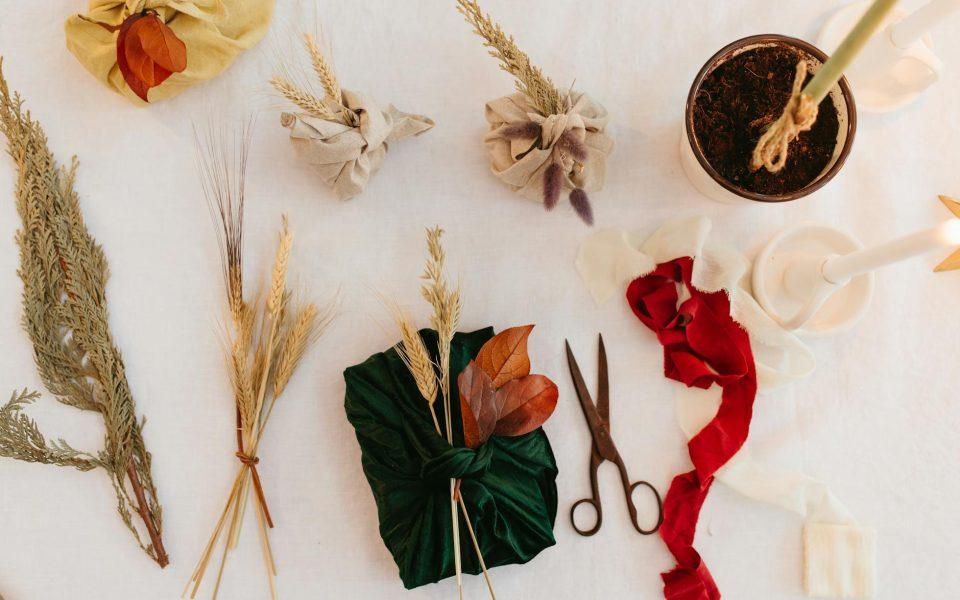This story was first published by Stacker.
The holiday season feels a little less jolly considering the amount of waste generated by gift-giving. The Environmental Protection Agency estimates the amount of household garbage in the U.S. increases by 25% between Thanksgiving and New Year’s.
After the decorations come down, all that waste heads to landfills, producing a significant contributor to climate change: methane gas. “Greening” the holidays is essential, and one simple tip is to think more about how sustainable the materials are in your decorations, decor, and, of course, gifts. Instead of plastics, you could opt for items that can be reused, are made of renewable materials or natural fibers that boast a smaller environmental impact in both production and durability.
Due to consumers’ desires for more eco-friendly goods, sustainable materials are among the biggest trends in home decor. Fortunately, there are plenty of affordable—and earth-conscious—home goods that make perfect holiday gifts.
Made Trade rounded up a list of sustainable home decor trends in 2025 that offer dozens of creative options for holiday gift-giving. Each trend includes examples of great gifts for the home and advice for ensuring items are sustainably produced or can help create a more eco-friendly space.

New Africa // Shutterstock
Indoor gardening
In the depths of winter’s gray days, it’s a real gift to see a little green, which is why indoor gardening gifts are a wonderful idea. Not only are they eco-friendly and promote sustainability—the more food you can grow yourself, the less you have to buy—they also foster an appreciation of nature and bring the natural world indoors to enjoy.
Sprouting kits and microgreens require minimal amounts of space and sunlight, but a sunny, south-facing window will permit a small herb garden or leafy greens for salads. If you’re not sure what kind of light your recipient has access to, go with gifting indoor grow lamps along with the plants, or pick a hardy, low-water houseplant—some can act as natural air purifiers too.
Tatiana Buzmakova // Shutterstock
Warm (and undyed) neutrals
When buying gifts for the home, consider what materials the items are made from and how far away they come from—not only are natural materials like rattan, jute, palm leaves, clay, organic cotton and linen, and ceramics more sustainable, but if they are being used by a local craftsperson, gifters are also saving on fossil fuels for the transportation. Plus, you’re helping the local economy by supporting local craftspeople, so it’s a win-win. Natural fiber pillows, sheets, blankets, and even doormats offer comfort and consideration of the environment.

Followtheflow // Shutterstock
Adaptive reuse
The most sustainable and eco-friendly gift is one you already have, so get creative about reusing materials already in or around your home (raid the recycling bin, find nice pieces of wood outside, wash out and reuse glass jars) to fashion them into new, thoughtful goods. Similarly, think vintage and secondhand—what items can you give a second life to by passing them along to someone who will find new meaning in them? Some of the most thoughtful gifts are small heirlooms—pieces of jewelry or a beloved ceramic dish—passed along to the next generation that will appreciate them.
New Africa // Shutterstock
Smart technology
Green technology offers ways to reduce our carbon footprint in everyday life, and smart thermostats, solar lights, smart sprinklers, and smart plugs all make great gifts, saving people money and conserving our valuable resources. For those looking into home renovations or updating decor, try a new light fixture paired with smart blubs, or a new window treatment with smart shades. Even something as simple as a rain barrel can reduce energy use—and while the technology for that isn’t very sophisticated, it certainly is, like composting, “smart.”

rokosvisualvibes // Shutterstock
Integrated outdoor living
Integrated outdoor living is the ultimate gift, allowing us to bring the natural world into our homes. However, doing so sustainably takes a little more effort than simply leaving the doors to the deck open all the time. First, find eco-friendly and sustainable outdoor furniture, perhaps thrifting it or buying it used and fixing it up for a one-of-a-kind gift. If you can’t go secondhand, choose furniture made of sustainable materials such as reclaimed wood, recycled plastic (great for outdoor rugs), or bamboo. For smaller gifts, consider solar lights, a water feature that recycles water, a rain barrel, or even a set of handmade wind chimes made from seashells.
Story editing by Carren Jao. Additional editing by Kelly Glass. Copy editing by Paris Close. Photo selection by Clarese Moller.
This story originally appeared on Made Trade and was produced and distributed in partnership with Stacker Studio.
Join the First Amendment Society, a membership that goes directly to funding TCB‘s newsroom.
We believe that reporting can save the world.
The TCB First Amendment Society recognizes the vital role of a free, unfettered press with a bundling of local experiences designed to build community, and unique engagements with our newsroom that will help you understand, and shape, local journalism’s critical role in uplifting the people in our cities.
All revenue goes directly into the newsroom as reporters’ salaries and freelance commissions.


Leave a Reply